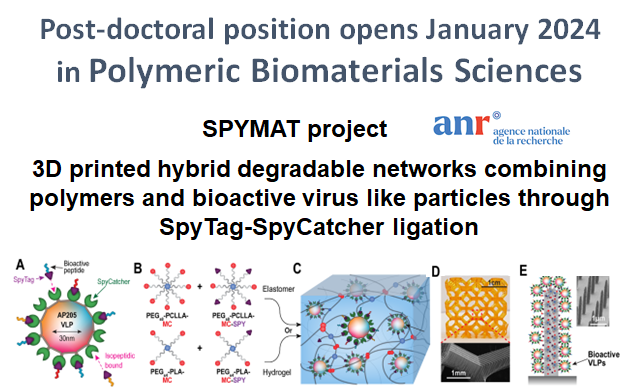
Post-Doc position : 3D printed hybrid degradable networks combining polymers and bioactive virus like particles through SpyTag-SpyCatcher ligation (SPYMAT)
2 years Post-doctoral position in Polymeric Biomaterials Sciences
3D printed hybrid degradable networks combining polymers and bioactive virus like particles through SpyTag-SpyCatcher ligation (SPYMAT)
financed by the French National Agency for Reseach (ANR)
The objective of the SPYMAT project is to develop hybrid biomaterials to overcome the limitations of biomaterials available for advanced medical devices or scaffolds for tissue engineering (TE). Indeed, current biomaterials are far from fulfilling all requirements : tunable mechanical properties, spatially localized biofunctionalities, compatibility with advanced processes, degradability and, when it comes to TE, mimic specific stem cell niches.
The SPYMAT project proposes to address these challenges by combining resorbable photopolymers suitable for photostructuration via one or two photons excitation, with Virus-Like Particles (VLPs) that will be responsible for a controlled and efficient presentation of bioactive peptides. SPYMAT will benefit from original approaches in the key aspects of the project: control and modularity of the biofunctiona-lity via VLPs, control and modularity of the networks mechanical and degradation
properties via star-shaped polyether-polyester block copolymers, efficient ligation via isopeptidic bounds formation using SpyTag/SpyCatcher (SpyT/SpyC), control of the medical devices or scaffold design via one or two-photons photopolymerization 3D printing.
This highly interdisciplinary project will be carried out in the Department of Polymers for Health andBiomaterials (PHBM) of the Institute of Biomolecules Max Mousseron (IBMM) in Montpellier-France, under the supervision of Pr. Benjamin Nottelet. PHBM has extensive experience in the domain of degradable polymers for medical devices and controlled release systems. As part of an ANR project, SPYMAT will be conducted with the “Institut de Science des Matériaux de Mulhouse” (IS2M) through collaborations with Dr. Laurent Pieuchotfrom the team “Biomaterials-Biointerfaces” specialist of VLPs, and with Dr. Arnaud Spangenberg from the team “Molecules, Nano-, Micro-Structures” specialist of
VAT-photopolymerization and 3D-printing. On the scientific aspects, you will be in charge of developing the photopolymers, the photoresins and evaluate their processability before transfer to the IS2M teams. The tasks will be divided as follows:
– synthesis of degradable star photocopolymers with/without SpyTag
– processing of the photocurable polymers to yield networks with/without SpyTag
– evaluation of the networks properties (mechanical, degradation)
– preliminary biocompatility studies
On the project management aspects, you will be responsible for:
– the daily coordination of the project with the consortium members, more specifically with the two other post-doc fellows hired at IS2M to ensure the required retroactions between the workpackages.
– the valorization/dissemination of the results through the writing of articles and communications at all levels (from local to international)
– the reporting of the project with the coordinator Pr. Benjamin Nottelet
The position will start in January 2024.
Salary: 2360€ per month net wage
Keywords: Implantable medical device, tissue engineering, degradable elastomers, degradable
hydrogels, polymer networks, hybrid biomaterials, polymer chemistry, 3D-photoprinting
Skills: Materials science, physical chemistry of polymers, chemistry, English
Duration and location: 2 years, IBMM-Polymers for Health and Biomaterials, Montpellier, FR
Supervisor and contact: Pr. Benjamin Nottelet Benjamin.Nottelet@umontpellier.fr
Please send your detailed CV, motivation letter and at least two emails of reference persons.


